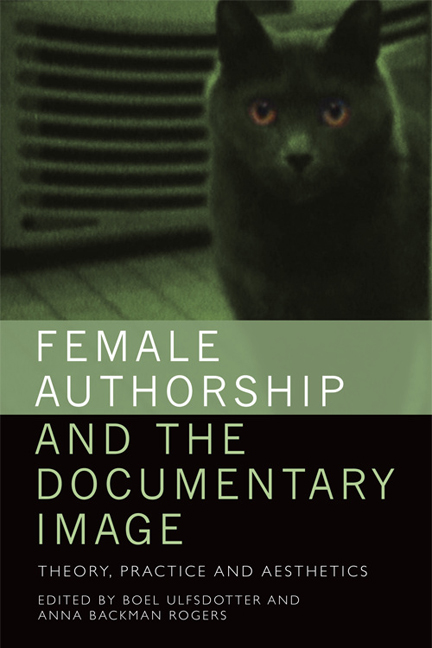Book contents
- Frontmatter
- Contents
- List of Illustrations
- Notes on the Contributors
- Foreword
- Introduction
- PART ONE DOCUMENTARY PRACTICES
- PART TWO DOCUMENTARY THEORIES
- PART THREE FEMALE AUTHORSHIP AND GLOBAL IDENTITIES
- ‘Being a Woman Documentary Maker in Taiwan’ – An interview with Singing Chen and Wuna Wu
- Select Bibliography
- Index
4 - The Feminist Voice: Improvisation in Women’s Autobiographical Filmmaking
Published online by Cambridge University Press: 05 May 2021
- Frontmatter
- Contents
- List of Illustrations
- Notes on the Contributors
- Foreword
- Introduction
- PART ONE DOCUMENTARY PRACTICES
- PART TWO DOCUMENTARY THEORIES
- PART THREE FEMALE AUTHORSHIP AND GLOBAL IDENTITIES
- ‘Being a Woman Documentary Maker in Taiwan’ – An interview with Singing Chen and Wuna Wu
- Select Bibliography
- Index
Summary
Bill Nichols introduces his reader to documentary modes by forewarning that ‘definitions of documentary are always playing catch-up’ and that these definitions need to be reconsidered regularly. Documentary has never been, and will never be, only one thing; its definition is fluid and always changing. The one consistency in documentary about which Nichols speaks is his concept of ‘Voice’, the filmmaker's ultimate power over the form of the work. He describes Voice as: ‘The selection of shots, the framing of subjects, the juxtaposition of scenes, the mixing of sounds, the use of titles and inter-titles – all the techniques by which a filmmaker speaks from a distinct perspective on a given subject’.
Likewise, this documentary voice also has the power to name – labelling actions, objects, concepts and thoughts, potentially transforming them for the viewer. This correlates with the scientific model: the goal of any human in any interaction with an object – film – should be full intellectual control over that object. Power as subject is enacted through naming, designing and controlling objects.
However, women, who do not find themselves in a position to speak freely, cannot easily adopt this form of Voice as their own. The patriarchal construction of the documentary mode of filmmaking closes meaning for female subjects, particularly those whose goal is self-reflection and autobiography in film form. The history of the female form-as-object on screen and the silencing of women's self-identified experience in the documentary film canon creates a non-space for female autobiographical documentary filmmakers. As philosopher Luce Irigaray states, ‘Because woman is considered as either a castrated version of, or compliment to, man, there is no room in patriarchy for her to exist as a subject.’ At this point, female filmmakers continue to use the same vocabulary of making as that of the oppressor: one that establishes a relationship of power-to, the ability to perform, and power-over, a freedom contingent on circumstances that women simply do not have. The use of this paternal language separates the relationship of the body from the mind, relegating interaction with the world and subjective meaning and identity to a series of sign systems. Feminist autobiography stands against this cultural construction and questions the authority of single-perspective representations of women. As Audre Lorde states, we can locate revolutionary change in identifying ‘that piece of the oppressor which is planted deep within each of us’.
- Type
- Chapter
- Information
- Female Authorship and the Documentary ImageTheory, Practice and Aesthetics, pp. 75 - 89Publisher: Edinburgh University PressPrint publication year: 2018



